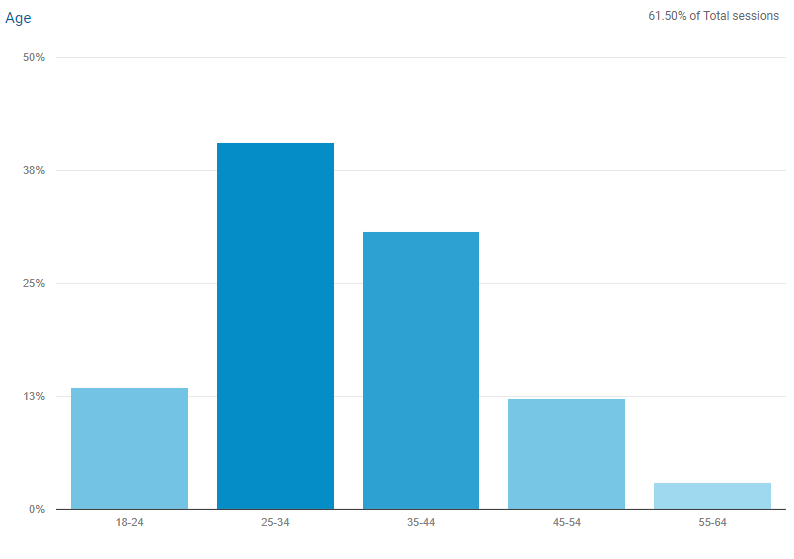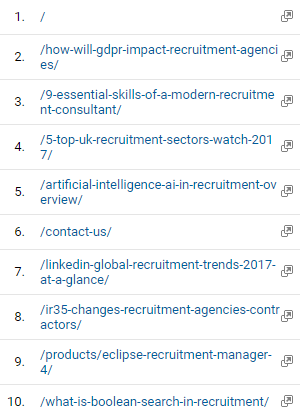
As a recruitment agency, your website is the bedrock and foundation from which your online brand to new clients and candidates is built on. It acts as your shop window, so that website visitors can review and decide, from the outset, whether you provide the services that they need.
But how can you tell if your website is candidate or client focused? And, furthermore, which one is more important?
Does Your Website Attract Clients Or Candidates?
There are a number of ways that you can identify whether your website is more client or candidate focused and in the majority of cases, you should have a pretty good idea already. A quick acid test is take a look at the primary pages on your website and count how many you have designed for clients vs candidates. Ask yourself questions such as:
Do you have more pages providing advice for candidates searching for their next job?
Are you more focused on how to help businesses attract, recruit and retain staff?
What imagery and language do you utilise on page and who does it appeal to?
You may think that the difference isn’t that significant, but, if 70% of website pages are job orientated, it stands to reason that the majority of your traffic will be from candidates.
Now that you have a basic theory, you can use the Google Analytics data from your website to back it up. If you haven’t already added Google Analytics to your website, have a read of this guide from Moz to explain the basics and how to install it. Once added, it typically takes two weeks (minimum) before you can collect enough data and make any useful insights. The more data you have collected in Google Analytics, the more accurately you can identify who your engaged audience are.
By having a look at the demographics of the visitors to your website, such as age, gender and geographic location, as well as what your most popular pages are, you’ll should begin to build a much more comprehensive picture of who your website really attracts.
NB: Set the date range to cover at least 3 months or as much time as you have set up Google Analytics for.
Go to Audience > Demographics > Overview

There are many more elements that will help you identify whether you are more focused on clients or candidates. For instance, by having a look at what the most popular landing pages are, you can gauge what your audience is most attracted to and what this says about your website. If your most popular landing page is a blog post about “How GDPR will impact recruitment agencies” you can draw the conclusion that a good chunk of visitors are, in fact potential clients.
Go to Behaviour > Site Content > Landing Pages

By exploring your website and Google Analytics, you should have a much clearer picture of who your website attracts. If this was not the answer you expected, do not fear. In the next section, you’ll find out how to attract more clients or candidates to your website.
How Do You attract More Clients To Your Website?
The raison d’etre for any recruitment agency website is to attract visitors and convert them into active clients or candidates. This is a simple concept but it should always be referred back to, even when making minor changes to your website. Ask yourself:
Will this attract or convert more visitors into clients or candidates?
If not, is it a valuable use of your time?
Three ways you can improve your website for clients are:
1. Make Your Service Pages Stand Out
Service pages are the pages on your website that inform the visitor of who you are, what service you provide, what expertise you have and how the visitor can contact you for more information. They can often be the difference between a potential client contacting you or one of your competitors. However, in some cases, these web pages can lack authenticity, brand personality and a clear next step.
Your service pages should:
- Clearly state your expertise and the geographical location you primarily operate in, without ambiguity.
- Explain why you stand out from your competitors and what makes you the right agency for them.
- Direct them to contact you for further information either through a short online form or by calling you directly.
By using the same language that your target audience uses and showing your brand personality, you will have a better chance of making a connection with your website visitors and convincing them to take the next step.
2. Create Targeted Blog Content Addressing Your Client’s Problems
The power of creating blog posts lies in attracting website visitors through search engines and social media. To attract these visitors, you simply need to create content that they want to read and that resonates with them. To do this you must:
- Know what your potential clients look like.
- Identify their business pain points, challenges and goals.
- Write content that answers their questions, provides a solution to their challenges or helps them towards achieving their goals.
By writing content that they will find valuable, you will not only attract more potential clients to your website, you will also be solving their recruitment problems and therefore much more likely to be remembered by them in the future.
Learn more about the benefits of writing blogs.
3. Create A Clear Path To Conversion
In this instance, a website conversion is defined as turning an unknown website visitor into an identifiable lead or prospect. Creating a clear path to conversion means every page needs to have an obvious next step, with the precise aim of collecting web visitors’ information. By collecting web visitors’ information, you can identify who they are and what services they might be looking for. This will make it easier for your business development team to qualify website leads and decide whether they are worth following up.
For example, a typical client journey might be searching Google for: “What are the best questions to ask a candidate during an interview?”. They may then visit a blog on your website which answers this question and gives them exactly what they are looking for.
The most relevant next step might be to direct these visitors to a downloadable guide “5 Steps to Conducting A Successful Interview”. By putting this download behind a form on your website, you can harvest lead information whilst also providing your target audience with even more valuable information.
How Do You Attract More Candidates To Your Website?
The strategy for attracting more candidates to your website is very similar to attracting more clients but, instead of focusing on client service pages, you will need to optimise the pages that attract candidates.
Optimise Your Job Adverts
Your job adverts should always achieve two goals; be clear and engaging to the candidates who it is aimed at; be clear to Google and other search engines what content is on-page.
Recruiters are often guilty of writing “one-size-fits-all” job adverts which consist of complicated and ambiguous terminology and fail to create a clear representation of what the job will be like. By clarifying the role, what candidates will be expected to do on a daily basis and giving some insight into the employer, you stand a better chance of attracting candidates and converting them into applications.
Learn more about optimising your website’s job ads in our blog.
Create Targeted Content For Candidates
As for your clients, you need to know what your typical candidates look like and more importantly what they search Google for and engage with on social media. By identifying their interests, problems, goals and challenges, you can begin to write content that will attract candidates. However, this content will entirely depend on who you’re targeting because, as you can imagine, recruiters targeting graduates will need to write entirely different content to agencies who are targeting finance directors.
For example, if you are targeting graduates, you might want to write a blog post entitled:
7 Expert Tips For Your First Interview
Whereas, when targeting finance directors, you might want to write a blog post entitled:
7 Finance Trends That Will Impact 2018
Create A Clear Candidate Journey
Creating a clear candidate journey which gives every opportunity for candidates to get in touch or apply for roles is essential to making your website a success. As with clients, by making the next step as relevant as possible, you are more likely to capture lead information and identify who your content is attracting.
Who Should Your Website Attract?
This will completely depend on your business. You may have enough clients, but not enough candidates to fill the vacancies you’re recruiting for. On the other hand, you may have a healthy talent pool of active and passive candidates but not a dedicated client base.
For the majority of agencies, you will want to optimise your website to attract both candidates and clients and you can do this at the same time. By devoting time to focusing on the key pages of your website and writing blog posts that your audience want to read, you can attract and convert both candidates and clients simultaneously.
Want your website to become a lead generating machine. Learn how you can implement inbound marketing into your recruitment agency by downloading our free guide.
